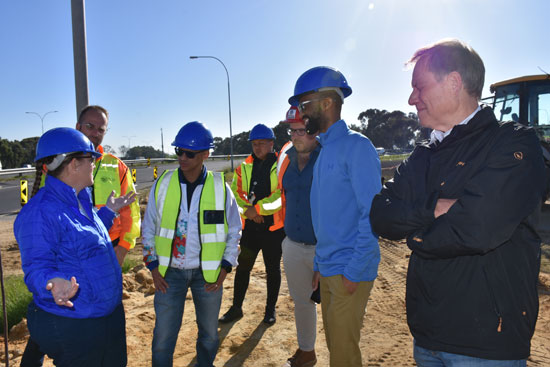By Thebe Mabanga
The Western Cape provincial government has prioritised supporting municipalities as well as improving infrastructure including roads, school, and human settlements in its 2025/2026 Budget, which was delivered in the provincial legislature last week and supported by departmental budget votes on Monday.
Delivering the Provinvincial Treasury Budget Vote, Peter Johnson, the Democratic Alliance (DA) Member of the Provincial Legislature (MPL) stated: “Today, we consider a budget that embodies not only fiscal responsibility but also a firm commitment to innovation, growth, and resilience.”
Dirk Wessels, the DA spokesperson for infrastructure said the budget “will unlock opportunity, empower communities, and build resilience into the heart of our province’s development.”
Alluding to the budget impasse that is unfolding at a national level, Wessels noted “while the ANC and its partners appear to be dancing to the tune of a budget that will deepen the struggles of ordinary South Africans – most notably through a 1% VAT increase over the next two years – the DA remains steadfast in its focus on delivery, efficiency, and long-term sustainability.”
Johnson announced an allocation of R22 million to support municipalities and provincial departments to help improve financial management and governance.
“When it comes to supporting local governments, Provincial Treasury has launched several capacity-building initiatives to assist municipalities and provincial departments,” said Johnson, adding: “These projects are designed to acquire, enhance, and retain the necessary skills, knowledge, tools, equipment, and other resources to ensure that departments and municipalities adhere to PFMA and MFMA legislation, thereby promoting sound financial governance.”
The Western Cape Government said it has developed a Fiscal Futures Tool, a data-driven that enables government to forecast key economic trends – such as GDP growth and revenue fluctuations – and assess their impact on provincial finances.
Johnson says almost R30 million has been allocated to the Western Cape Gambling and Racing Board, a key source of revenue for the province.
The entity is expected to raise R1,3 billion in taxes over the medium term.
The province is also putting concerted effort to improve infrastructure delivery.
Wessels announced that the 2025/26 infrastructure allocation is R9.82 billion, which he described as strong commitment to growth.
“The Western Cape’s infrastructure programme remains one of the largest and most ambitious in the country.”
Infrastructure development initiatives include the establishment of an infrastructure panel of experts to assist with Alternative and Blended Finance initiatives by evaluating infrastructure projects.
“This is a proactive measure in addressing national fiscal constraints by diversifying its financing mechanisms for infrastructure development,” said Wessels, noting: “By turning to alternative financing options, such as Public-Private Partnerships (PPPs), and collaborating with global financial institutions, the WCG is aiming to ease budgetary pressures and ensure major infrastructure projects can still move forward.”
Blended finance is a combination of products including loans, grants, and concessions to fund infrastructure.
Wessels described infrastructure as “the foundation upon which opportunity is built”.
This year R11. billion is being invested into transport and roads infrastructure.
This includes spending by the South African National Roads Agency (SANRAL) on the Malmesbury bypass, for example.
“Roads are not just for movement. They are economic arteries, which not only reduce traffic congestion but boost logistics, commercial access, and regional connectivity.”
The province has allocated R2.2 billion for upgrading informal settlements, including areas such as Thembalethu, Silverton, Vredendal Phase 8, Caledon, Villiersdorp, and the N2 Gateway.
Western Cape is also investing a total of R5.7billion in housing and settlements over the next three years.
The settlements include Conradie Park, a mixed-use, affordable housing “right in the urban core,” according to Wessels, with integrated schools, clinics, retail space, parks, and public transport.
There is also Mountain Ridge in Paarl and George’s Metro Grounds where government broke new ground by handing over houses and title deeds on the same day.
Wessels said the government is also investing R246 million over the MTEF in community-based programmes and skills development.
This includes: R51.6 million for the Masakh’iSizwe Bursary Programme, helping young engineers, quantity surveyors and built environment professionals enter the sector.
There is R14.9 million for artisan development, and R168.6 million for enterprise development, helping small contractors and emerging businesses become sustainable participants in the infrastructure economy.
But opposition parties expressed scepticism about various aspects of the budget.
The ANC argued that the DA cannot table the budget when, at national level, they rejected the budget that provides 95% of the provincial budget through the equitable share.
EFF, on the other hand, rejected the education infrastructure allocation, arguing that the province’s education system remains unequal in terms of access and still favours schools in quintiles 4 and 5, the former Model C schools.
Brett Herron of the GOOD Party sought to cast doubt on the Human Settlements Budget.
He pointed out that the site that is being announced for mixed used development on the fringes of the inner city was identified over ten years ago yet no development has occurred and is now being dressed up as new.
He also pointed to the department’s failure to spend grant allocations from the national department such that R800 million in grants over two years from 2023 had to be returned to national government.
INSIDE METROS

